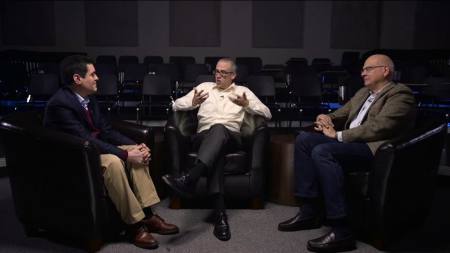Why Evangelical Leaders Opposed to Trump Speak for More Evangelicals Than You Think

Trump-supporting evangelical leaders often claim to speak for the vast majority of evangelicals. They're wrong.
A group of evangelical leaders, most of whom opposed President Donald Trump, met at Wheaton College this week.
One of the meeting's participants, Darrell Bock, executive director of cultural engagement at Dallas Theological Seminary, told The Christian Post that the meeting was not designed to counter Trump's evangelical supporters. I don't buy that either. None of the evangelical leaders who participate in Trump's evangelical advisory board, called the "Faith Leaders Initiative," were invited. Plus, Doug Birdsall, honorary chair of the Lausanne movement of evangelicals and one of the meeting's organizers, told The Washington Post that the meeting came about because of Trump's association with evangelicals.
"When you Google 'evangelicals,' you get Trump. When people say what does it mean to be an evangelical, people don't say evangelism or the Gospel. There's a grotesque caricature of what it means to be an evangelical," he said.
Some of Trump's evangelical advisers are suggesting that the evangelicals at the Wheaton meeting represent only a small slice of American evangelicals.
"It's a meeting that will have very little impact on evangelicalism as a whole. Many of them are sincere but they are having a hard time understanding that they have little impact on evangelicalism," First Baptist Dallas Pastor Robert Jeffress told CBN News.
Southern Evangelical Seminary President Richard Land told One News Now, "Any definition of 'thought leaders' and any definition of evangelicalism that excludes the Billy Graham Evangelistic Association and Franklin Graham is a pale imitation — anemic and incomplete." (Land is also executive editor of The Christian Post.)
Trump-supporting evangelicals have a history of claiming to speak for the vast majority of evangelicals.
Trump was "elected with 81 percent of evangelicals, that's the largest margin in history," Jeffress claimed in an April 8 interview on Fox News. It's a stat Jeffress cites whenever he's interviewed about Trump.
But the "81 percent" number is bogus. Here's why:
1) It's based upon an exit poll and exit polls are some of the least accurate polls.
2) It includes only white evangelicals.
3) It includes only evangelicals who voted.
4) It's based upon self-identification, not whether the respondent actually holds evangelical beliefs or is active in an evangelical church.
Ryan Burge, a political science instructor at Eastern Illinois University, ran the numbers using the Cooperative Congressional Election Study, a more accurate sample than exit polls. He found 75.8 percent of white evangelical voters, defined by denominational affiliation, voted for Trump. When non-white evangelicals (except black evangelicals) were included, only 60 percent of evangelical voters backed Trump. Since black voters heavily favored Hillary Clinton, that number would be even lower if they were included.
What about the 41 percent of voting eligible evangelicals who didn't vote (according to Barna)? Non-voters tend to be either un-engaged from politics or unenthused by their choices. So chances are you won't find many Trump supporters among them.
Further complicating the "81 percent" figure, many who identify as an evangelical don't even hold evangelical views. These aren't real evangelicals. Plus, some who hold evangelical views don't identify as evangelical.
A survey conducted by LifeWay found that less than half, 45 percent, of self-identified evangelicals have evangelical beliefs. And, among those who have evangelical beliefs, 31 percent don't identify as evangelical. The non-identifying evangelicals look more like the evangelicals who didn't support Trump — they are more racially diverse. Those who hold evangelical beliefs are 58 percent white, while self-identifying evangelicals are 70 percent white.
Taken together, what do all these stats mean? At best, Trump-supporting evangelicals represent about half of all evangelicals, and it could be much less than that, depending on how you define evangelical. And, the non-Trump-supporting evangelicals are more racially and ethnically diverse than the Trump-supporting evangelicals.
Tim Keller reportedly said at the Wheaton meeting, "There's now a red evangelicalism and a blue evangelicalism. As the country has become more polarized, so has the Church."
That's not quite right. The non-Trump-supporting evangelicals aren't necessarily "blue" or Democrats. They're just not Republicans, especially Trump-Republicans.
The notion that Keller has "little impact on evangelicalism," as Jeffress said, is absurd, as anyone who understands American evangelicalism can tell you. Keller is a popular evangelical theologian, speaker and author. His books have made The New York Times' best-seller list. We often report on his sermons here at The Christian Post. And he has 360,000 Twitter followers. (Jeffress has 48,900.)
In all likelihood, Jeffress doesn't even represent most of the evangelicals who voted for Trump. Many of them were probably reluctant Trump voters, voting more out of fear of a Clinton presidency, than enthusiastic Trump supporters like Jeffress. As I pointed out in a May 2016 column, using polling data from many different sources, Trump was never popular among evangelicals before he became the Republican presidential nominee. Jeffress was one of the few evangelical leaders who supported him from the beginning. The reluctant evangelical Trump voters likely share many of the concerns of the Wheaton meeting evangelicals.
Not only do the evangelical leaders at the Wheaton meeting represent a large portion of evangelicals (possibly a majority), they represent it's future. In a Twitter exchange, Burge told me that among evangelicals 18 to 19 and younger, less than half are white.





















